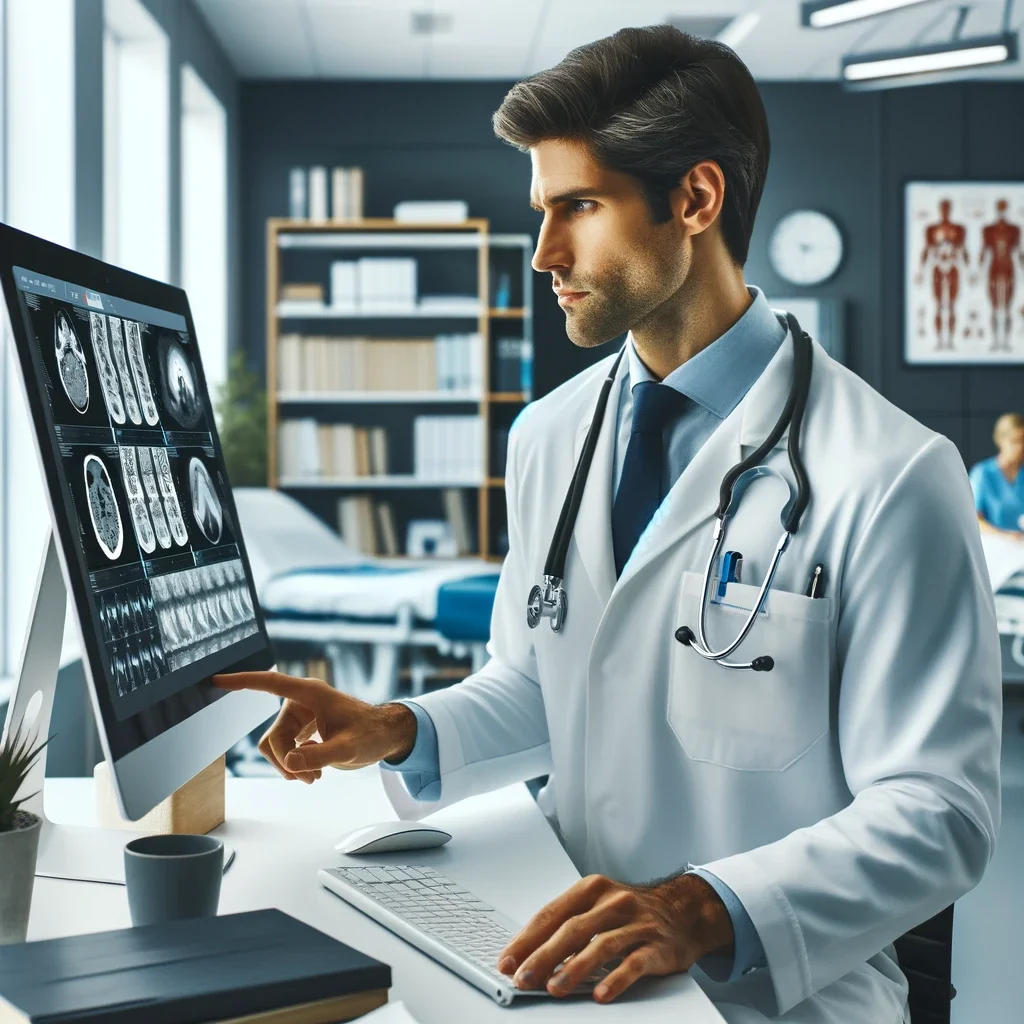Introduction to Diagnostic Medicine
Let’s explore the role of a diagnostic doctor.
Diagnostic medicine plays a pivotal role in healthcare.
It involves identifying diseases and conditions through various tests and examinations.
This medical field is crucial for effective treatment planning and patient care. Diagnostic doctors, or diagnosticians, spearhead this crucial task.
They interpret test results and medical images to diagnose patient health issues.
Importance in the healthcare system
The importance of diagnostic medicine in the healthcare system cannot be understated.
It serves as the foundation for any treatment plan.
Without accurate diagnosis, treating a patient accurately becomes nearly impossible.
Diagnosticians thus ensure that patients receive timely and appropriate care, which can be lifesaving.
Overview of a diagnostic doctor’s role
A diagnostic doctor’s role is multifaceted.
They collaborate closely with other medical professionals to gather comprehensive patient health information.
This includes reviewing medical histories, ordering and analyzing tests, and sometimes performing procedures to gather necessary data.
Their expertise allows them to detect subtle signs of illness that might otherwise go unnoticed.
By doing so, they play a critical role in guiding the course of patient treatment and, ultimately, in improving patient outcomes.
Educational Path of Diagnostic Doctors
Required academic background
The path to becoming a diagnostic doctor in the United States is rigorous and demanding.
Aspiring physicians must first secure a strong academic foundation.
This typically begins with a bachelor’s degree in pre-med, biology, chemistry, or a related science field.
These programs ensure students gain the necessary knowledge in the sciences, mathematics, and humanities.
They also prepare them for the Medical College Admission Test (MCAT).
Medical school and specialization
After undergraduate studies, the next step involves attending medical school, which spans four years.
Transform Your Career Today
Unlock a personalized career strategy that drives real results. Get tailored advice and a roadmap designed just for you.
Start NowThe first two years of medical school focus on classroom-based instruction in the basic sciences.
Courses cover anatomy, biochemistry, pharmacology, and physiology.
The final two years shift to clinical rotations in various medical specialties.
Here, students gain hands-on experience in hospitals and clinics, observing and participating in patient care.
Upon completing medical school, graduates earn their Doctor of Medicine (MD) or Doctor of Osteopathic Medicine (DO) degrees.
However, the journey doesn’t end there. Future diagnostic doctors must then enter a residency program in their chosen specialty.
Residencies in diagnostic fields, like radiology or pathology, typically last four years.
These programs provide intense, supervised training in interpreting medical images or laboratory tests to diagnose diseases.
After residency, some doctors choose to pursue further specialization through fellowship programs.
These one to three-year programs offer advanced training in sub-specialties such as interventional radiology or hematopathology.
Fellowships allow doctors to gain deeper expertise in specific areas of diagnostics.
Licensing and certifications
Licensing is a crucial step in a diagnostic doctor’s career.
Physicians must pass the United States Medical Licensing Examination (USMLE) or the Comprehensive Osteopathic Medical Licensing Examination (COMLEX-USA) for DOs.
The exams test knowledge, concepts, and principles crucial to health and disease management and effective patient care.
Doctors must obtain a license from the state in which they plan to practice.
Each state has its own requirements, but all mandate passing these exams.
Beyond state licensing, certification by the American Board of Medical Specialties (ABMS) or the American Osteopathic Association (AOA) sets the gold standard for diagnostic physicians.
Board certification involves rigorous exams and peer evaluations.
It demonstrates a doctor‘s expertise in a specialty or sub-specialty.
For diagnostic fields like radiology or pathology, certification by the American Board of Radiology (ABR) or the American Board of Pathology (ABP) is essential.
Transform Your Career Today
Unlock a personalized career strategy that drives real results. Get tailored advice and a roadmap designed just for you.
Start NowDoctors often need to renew their certification periodically, proving their commitment to continuous learning and excellence in their field.
The road to becoming a diagnostic doctor in the US encompasses a formidable academic and practical training journey, from undergraduate education to medical school, followed by residency and possible fellowship.
Subsequently, obtaining licensure and board certification solidifies a doctor’s ability to diagnose diseases and conditions accurately.
This extensive process ensures diagnostic doctors possess the necessary skills and knowledge to provide high-quality care to their patients.
Read: America‘s Healthcare Rankings: How Do Doctors Make an Impact?
Core Responsibilities of Diagnostic Doctors
In the complex world of healthcare, diagnostic doctors play a pivotal role.
They serve as the first line of defense, deciphering the underlying causes of symptoms.
Their work is intricate, requiring a deep understanding of medical science and an unwavering commitment to patient care.
Let’s delve into their core responsibilities.
Patient Consultation and Medical History Analysis
Every diagnostic process begins with a consultation.
Here, doctors listen carefully to patients, understanding their symptoms and concerns.
They meticulously analyze medical histories, piecing together puzzles of health patterns.
This step lays the groundwork for accurate diagnosis.
Performing Physical Exams
Physical exams form another critical aspect.
Through thorough examinations, doctors assess patients firsthand. They check vital signs, listen to heartbeats, and look for physical signs.
These exams often reveal clues to the patient’s condition.
Ordering and Interpreting Diagnostic Tests
No stone goes unturned in the quest for answers.
Diagnostic doctors order blood tests, imaging, and other procedures as needed. But they don’t stop there.
They also interpret the results, drawing on their expertise to understand what these findings mean for the patient.
Collaborating with Other Healthcare Professionals
Healthcare is a team sport. Diagnostic doctors frequently collaborate with specialists and other healthcare professionals.
Transform Your Career Today
Unlock a personalized career strategy that drives real results. Get tailored advice and a roadmap designed just for you.
Start NowThey share findings, seek second opinions, and discuss treatment options.
This collaborative approach ensures comprehensive care for the patient.
Following up with Patients Regarding Test Results and Care Plans
Communication doesn’t end with diagnosis. Doctors follow up with patients, explaining test results in understandable terms.
They discuss care plans, ensuring patients are informed and involved in their treatment decisions.
This step is crucial for effective care and patient peace of mind.
The role of diagnostic doctors is multifaceted and indispensable.
They are detectives in the medical field, uncovering the mysteries behind symptoms and conditions.
Their keen analytical skills, combined with a compassionate approach to care, make them central to patient diagnosis and treatment.
By fulfilling these core responsibilities, diagnostic doctors ensure that patients receive timely, accurate, and comprehensive care.
Read: Specialization Options for Doctors in the United States
Specialized Fields Within Diagnostic Medicine
Diagnostic medicine plays a crucial role in healthcare.
It involves specialized fields. Each has its unique importance.
These include Radiology, Pathology, Oncology diagnostics, and Neurodiagnostics.
Let’s delve into each field below.
Radiology
- Radiologists use imaging to diagnose diseases.
- They employ X-rays, CT scans, MRI, and ultrasounds.
- These tools allow them to explore deep within the body.
- They can identify fractures, tumors, and conditions like pneumonia.
- Radiologists often work closely with other specialists.
- They help to plan patient treatment strategies.
- Their skills are indispensable in emergency rooms.
- Quick and accurate imaging can save lives in critical situations.
Pathology
- Pathologists are the detectives of the medical world.
- They examine tissues, blood, and body fluids.
- Their work involves identifying diseases at the microscopic level.
- This includes cancer, infections, and autoimmune disorders.
- Pathologists play a vital role in confirming diagnoses.
- They often work behind the scenes.
- Yet, their conclusions guide the course of treatment.
- Their expertise also extends to overseeing laboratory tests.
- They ensure the accuracy and reliability of results.
Oncology Diagnostics
- Oncology diagnostics focus on detecting and characterizing cancer.
- Specialists in this field use various methods.
- These include imaging, laboratory tests, and biopsies.
- They work to determine the type, stage, and genetic makeup of cancer.
- This information is critical.
- It shapes tailored treatment plans for patients.
- Oncology diagnostics also play a role in monitoring disease progression.
- They assess the effectiveness of treatments.
- With advances in technology, this field is rapidly evolving.
- New methods offer hope for earlier detection and better outcomes.
Neurodiagnostics
- Neurodiagnostics specialists focus on the nervous system.
- They use tools like EEGs, EMGs, and brain scans.
- These methods help diagnose neurological conditions.
- This includes epilepsy, stroke, and degenerative diseases.
- Neurodiagnostics can also monitor brain activity during surgery.
- This ensures patient safety.
- The field is essential for developing targeted treatment plans.
- It helps improve quality of life for individuals with neurological conditions.
In a nutshell, each specialized field within diagnostic medicine has its importance. Radiologists provide a window into the body.
Pathologists uncover the nature of diseases. Oncology diagnostics guide cancer treatment.
Neurodiagnostics offers insights into the nervous system. Together, they form a vital part of the healthcare system.
They enable precise diagnoses and guide treatment decisions.
Their work supports the delivery of personalized care. As technology advances, their roles will continue to evolve.
They remain essential in the quest for better health outcomes.
Transform Your Career Today
Unlock a personalized career strategy that drives real results. Get tailored advice and a roadmap designed just for you.
Start NowRead: Interprofessional Collaboration: Pharmacists and Doctors
Challenges Faced by Diagnostic Doctors
Diagnostic doctors face a multitude of challenges in their daily practice.
These professionals play a pivotal role in healthcare, working diligently to ascertain the root causes of patient ailments.
However, their journey comes with unique obstacles that demand constant vigilance, adaptability, and keen ethical considerations.
Let’s delve into these challenges in more detail.
Staying Updated with Technology and Medical Advancements
- Medical science evolves rapidly. Doctors must continuously learn.
- New diagnostic tools and methodologies emerge often.
- They attend regular workshops and seminars to keep abreast of changes.
- Adapting to the latest technologies can be time-consuming and costly.
- Technological advancements alter diagnostic processes and patient management.
Dealing with Uncertain Diagnoses
- Not all symptoms point directly to a single disease.
- Diagnostic doctors sometimes encounter rare or complex cases.
- They must consider multiple potential diagnoses.
- Decision-making becomes critical yet challenging under uncertainty.
- They rely on interdisciplinary collaboration for complex cases.
Managing Patient Anxiety Regarding Procedures and Results
- Patients often feel anxious about diagnostic procedures and outcomes.
- Doctors must communicate effectively to ease their fears.
- Ensuring clarity about the necessity and safety of tests is vital.
- They also prepare patients mentally for possible outcomes.
- Managing emotional reactions to diagnoses requires empathy and patience.
Ethical Considerations in Diagnostic Testing
- Diagnostic testing brings up significant ethical dilemmas.
- Doctors weigh the benefits and risks of specific tests.
- They must consider the patient’s privacy and consent.
- Genetic testing poses questions about future insurability and employment.
- They strive to avoid unnecessary tests that could burden patients financially.
In essence, diagnostic doctors navigate a challenging landscape filled with rapid technological changes, uncertain diagnoses, patient anxieties, and ethical quandaries.
Each day, they make decisions that mirror not just their expertise and commitment to patient care, but also their ongoing struggle to remain on the cutting edge of medical practice.
It demands not only a robust foundation of medical knowledge and diagnostic skill but also a profound commitment to continuous learning, patient empathy, and ethical vigilance.
These professionals work tirelessly, employing every tool and piece of knowledge at their disposal, to unveil the mysteries hidden within the human body, guiding their patients towards accurate diagnoses and effective treatments.
Thus, while their road is fraught with obstacles, the importance and impact of diagnostic doctors within the healthcare system cannot be overstated, making their role both challenging and vitally significant.

Impact of Diagnostic Doctors on Patient Care
Diagnostic doctors play a critical role in the realm of patient care.
Through their expertise, they significantly influence the detection, treatment, and outcomes of various diseases.
The impact of their work extends across several key areas, profoundly affecting the patient experience and recovery process.
Early Detection of Diseases
One primary contribution of diagnostic doctors involves the early detection of diseases. This early detection translates into numerous benefits for patients:
- It reduces the risk of disease progression.
- Patients receive timely interventions, preventing complications.
- It enhances the chances of successful treatment.
- Lowers the overall cost of healthcare by reducing the need for more complex treatments later.
By using advanced diagnostic tools and their keen expertise, these doctors can identify conditions at their nascent stages.
This ability is particularly crucial for diseases like cancer, where early detection can markedly improve survival rates.
Personalized Treatment Plans
Diagnostic doctors also pave the way for personalized treatment plans. They achieve this through:
- Understanding the specific nature of the disease in individual patients.
- Identifying the genetic makeup of conditions, where applicable.
- Assessing how various factors might influence treatment effectiveness.
This tailored approach ensures patients receive the most effective care suited to their unique conditions.
Thus, it not only enhances treatment efficacy but also minimizes the risk of adverse reactions.
Improved Patient Outcomes
The work of diagnostic doctors significantly impacts patient outcomes. This impact manifests through:
Transform Your Career Today
Unlock a personalized career strategy that drives real results. Get tailored advice and a roadmap designed just for you.
Start Now- Higher rates of successful treatment.
- Reduced instances of misdiagnosis.
- Shorter recovery times.
Improved outcomes stem from the accurate diagnosis and resultant targeted treatment plans.
Patients benefit from treatments that precisely address their health issues, fostering quicker and more complete recoveries.
Case Studies Highlighting the Importance of Accurate Diagnosis
To underscore the importance of diagnostic doctors, consider these case studies:
- Case Study 1: A patient presented with non-specific symptoms was accurately diagnosed with early-stage pancreatic cancer. Thanks to early detection, the patient underwent successful surgery and made a full recovery.
- Case Study 2: A young athlete suffering from persistent fatigue was diagnosed with a rare heart condition. Through personalized treatment planning, the athlete returned to their sport with minimal risk.
- Case Study 3: An elderly patient’s misdiagnosed dementia turned out to be a treatable form of depression after a thorough evaluation by a diagnostic doctor. The accurate diagnosis led to proper treatment and significant improvement in quality of life.
These cases highlight the transformative power of accurate diagnoses.
They showcase how diagnostic doctors directly contribute to saving lives, enhancing health outcomes, and improving the overall quality of patient care.
The role of diagnostic doctors in patient care cannot be overstated.
They facilitate early disease detection, enable personalized treatment plans, and are instrumental in achieving improved patient outcomes.
Their expertise and dedication remain central to advancing healthcare and ensuring patients receive the most effective and efficient care possible.
Read: Navigating Health Insurance and Billing for U.S. Doctors
Future Trends in Diagnostic Medicine
The future of diagnostic medicine stands at the threshold of a monumental shift.
Technological breakthroughs and the burgeoning field of genetics are transforming how doctors diagnose and treat patients.
Furthermore, telemedicine opens up unprecedented avenues for patient care, albeit with its set of challenges and opportunities.
This section delves into these critical aspects, shedding light on what the future may hold for diagnostic doctors in the United States.
Technological Advancements (AI, Machine Learning, etc.)
Diagnostic medicine is swiftly embracing technologies such as Artificial Intelligence (AI) and machine learning.
These tools significantly enhance diagnostic accuracy and speed. They analyze vast datasets quickly, identifying patterns that might elude human clinicians.
- AI algorithms now assist in detecting diseases from imaging scans with remarkable precision.
- Machine learning models predict patient outcomes, informing treatment decisions.
- Continuous updates in software ensure these systems stay at the forefront of diagnostic excellence.
These technological advancements promise a future where diagnoses are quicker, more accurate, and possibly at an earlier stage of the disease.
The Role of Genetics and Genomics
The burgeoning fields of genetics and genomics are reshaping diagnostic medicine fundamentally.
Understanding an individual’s genetic makeup is becoming crucial for diagnosing and treating diseases.
- Genetic screening can now identify predispositions to certain conditions early on.
- Personalized treatment plans, tailored to the patient’s genetic information, ensure more effective care.
- Continuous research uncovers new genetic markers for diseases, further refining diagnostic procedures.
This personalization of healthcare, rooted in genetics, promises to make treatments more effective and side effects less common.
Telemedicine and Remote Diagnostics
Telemedicine has emerged as a transformative force in diagnostic medicine, especially in a post-pandemic world.
Transform Your Career Today
Unlock a personalized career strategy that drives real results. Get tailored advice and a roadmap designed just for you.
Start NowIt facilitates remote diagnosis, making healthcare more accessible.
- Patients can now receive medical consultations from the comfort of their homes.
- Remote diagnostic tools, such as digital stethoscopes and otoscopes, enable accurate assessments over distances.
- This mode of healthcare delivery challenges traditional healthcare structures but also offers opportunities for innovation and accessibility.
The expansion of telemedicine and remote diagnostics signifies a move towards a more inclusive and accessible healthcare system.
Challenges and Opportunities for the Next Generation of Diagnostic Doctors
The evolving landscape of diagnostic medicine presents a unique set of challenges and opportunities for upcoming diagnostic doctors.
- The necessity to adapt to rapidly changing technologies and protocols demands continuous learning and flexibility.
- Doctors must now consider genetic information as an integral part of the diagnostic process, requiring a robust understanding of genetics.
- Embracing telemedicine involves mastering new communication skills and technologies, ensuring accurate diagnoses remotely.
- However, these challenges also present opportunities for innovation, improved patient care, and the democratization of healthcare access.
As the field of diagnostic medicine evolves, doctors will need to balance these demands with the opportunities that technological advancements and new methodologies provide.
The future certainly looks promising but demands adaptability, continuous learning, and an openness to innovation from the next generation of diagnostic doctors.
This evolution, grounded in technology, genetics, and telemedicine, will redefine the parameters of healthcare and diagnostic medicine in the years to come.
Discover More: Essential Skills for a Successful Medical Coder Career
Conclusion
Diagnostic doctors play a pivotal role in healthcare. They serve as the backbone, ensuring accurate diagnoses that shape treatment plans.
Their expertise bridges the gap between patient symptoms and effective treatment strategies.
This crucial role underscores the necessity for accuracy and depth in diagnostic medicine.
These professionals not only decode complex medical conditions but also pave the way for personalized medicine.
For those eyeing a career in this field, now is the time to step forward. The path demands dedication, continuous learning, and a keen analytical mind.
However, the rewards are profound. Diagnostic doctors significantly impact patients’ lives, contributing to both individual well-being and public health advancements.
The importance of diagnostic medicine continues to grow.
With advancements in technology and research, diagnostic methods are becoming more sophisticated.
This evolution not only enhances the accuracy of diagnoses but also improves patient outcomes.
As healthcare pivots towards a more preventative and personalized approach, the demand for skilled diagnostic doctors will undoubtedly rise.
Embrace the challenge if you aspire to make a difference in healthcare.
Diagnostic medicine offers a fulfilling and dynamic career, central to advancing healthcare and improving lives.
[E-Books for Sale]
The Big Book of 500 High-Paying Jobs in America: Unlock Your Earning Potential
$19.99 • 500 High-Paying Jobs • 330 pages
Explore 500 high-paying jobs in America and learn how to boost your career, earn more, and achieve success!
See All 500 High-Paying Jobs of this E-Book
1001 Professions Without a Degree: High-Paying American Jobs You Can Start Now
$19.99 • 1001 Professions Without a Degree • 174 pages
Discover 1001 high-paying jobs without a degree! Unlock career tips, skills, and success strategies for just $19.99!




